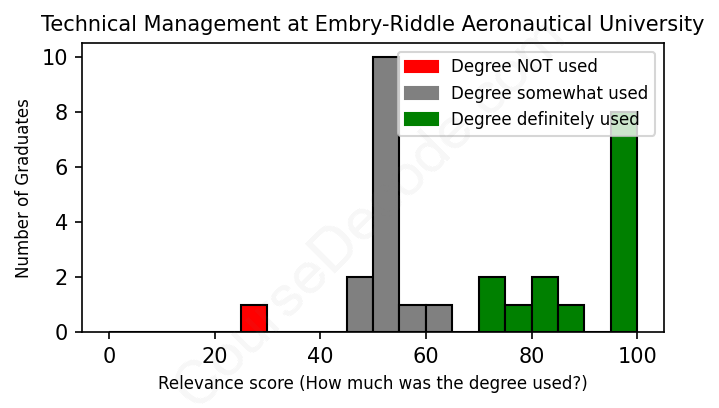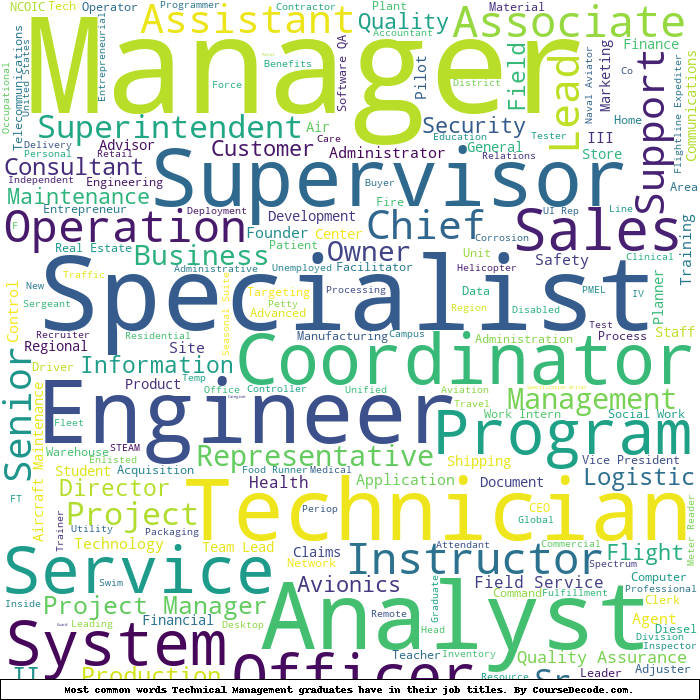
First, some facts. Of the Technical Management graduates from Embry-Riddle Aeronautical University we've analyzed , here's how many have used (or NOT used) their degree in their career:

These are estimates based on AI analysis of 29 LinkedIn profiles (see below).
The verdict? Slightly above average. Overall, with an average relevance score of 69%, Technical Management graduates from Embry-Riddle Aeronautical University have a slightly higher likelihood (+2%) of finding work in this field compared to the average graduate across all fields:
And for comparison, here's the chart for all profiles we've looked at across all degrees.
Also, after graduating, 44% of these graduates have pursued further education other than another Bachelor's degree (such as a Masters degree or other), compared to the average across all profiles of 35%. This suggests you may need more than just a Bachelors degree to be competitive as a Technical Management graduate.
See the details:
|
Relevance score: 50% We think this person has gone into a career only somewhat relevant to their degree. We think this person has gone into a career only somewhat relevant to their degree.
DEGREE INFOGraduated in 2016 from Embry-Riddle Aeronautical University with a Bachelors Degree in Technical Management. No other secondary education since. JOB HISTORY SINCE GRADUATIONAviation Mechanic Zenetex May 2018 - Present ABOUTNo information provided. |
The top 10 most common jobs done by the graduates we've analyzed (ranked most common to least) are:
When looking at the job paths of graduates from Embry-Riddle Aeronautical University with a degree in Technical Management, a few key trends emerge. Many of these individuals have found roles primarily in the aerospace and defense sectors, often with the US Navy or Air Force, where their technical skills and management knowledge come in handy. Positions like Aerospace Engineer, Program Manager, and various types of officers (like Logistics or Quality Assurance) reflect a strong application of technical management concepts, especially as these jobs often involve overseeing complex systems or projects. In a nutshell, careers in these areas generally align closely with what they learned in school, supporting the relevance of their degree.
However, not every job seems to utilize that Technical Management training equally well. Some graduates have ventured into roles that only vaguely relate to their degree, like positions in sales or logistics, where the focus is more on operational tasks or industry-specific knowledge rather than technical management skills. This is particularly notable in jobs that demand more of a managerial or financial angle, such as finance manager or operations analyst. So while many of the degree holders are able to find relevant positions that leverage their education effectively, a fair chunk of them seems to land in areas where their degrees aren’t fully applied, which might leave them feeling a bit disconnected from what they studied. Overall, it’s a mixed bag, with a solid portion of alumni successfully channeling their technical management expertise into meaningful careers, while others explore paths that may not fully utilize their potential.
Here is a visual representation of the most common words in job titles for Technical Management graduates (this is across all Technical Management graduates we've analyzed, not just those who went to Embry-Riddle Aeronautical University):

Graduates from Embry-Riddle Aeronautical University with a degree in Technical Management seem to have cultivated solid, varied career paths, especially in fields related to aviation, aerospace, and military services. Many of them, right after graduation, land jobs within the U.S. military or associated contractors—positions like aerospace engineers, project managers, and various aircraft maintenance roles are common. For instance, a lot of graduates seem to start their careers in technical roles with organizations like the U.S. Air Force or Navy, reflecting a strong alignment with their studies. This trend indicates that the degree is well-respected and often leads directly to relevant job opportunities.
Looking five to ten years out, these graduates often progress into more senior roles, like program managers or department leads, especially within the military and aerospace industries. A handful have shifted into corporate roles in companies like Eaton or Deloitte, showcasing their versatility and the value of their skills in different sectors. However, there are a few instances of graduates facing employment gaps or transitioning into unrelated fields, like logistics or even ownership of non-technical businesses. Overall, the majority maintain a strong connection to technical management in their careers, which suggests that a degree from Embry-Riddle provides a robust foundation for launching and advancing in the aerospace and related industries.
Honestly, a Bachelor's degree in Technical Management at Embry-Riddle can be pretty challenging, but it really depends on your background and interests. If you're into technology and management, it might click for you, but there are definitely some tough courses that involve a lot of analytical thinking and problem-solving. Embry-Riddle is known for its rigorous programs, so expect a solid workload and some intense projects along the way. If you have a passion for the subject and are willing to put in the effort, you might find it rewarding, but it’s definitely not a walk in the park!
Most commonly, in the LinkedIn profiles we've looked at, it takes people 4 years to finish a Bachelor degree in Technical Management.
Looking at the career paths of these graduates from Embry-Riddle Aeronautical University, it seems like many of them have indeed landed solid jobs, especially those who went into the military or technical fields related to aerospace. Positions at the US Air Force and US Navy often come with good salaries and benefits, which probably keeps their earnings decent. However, a few have hit bumps along the way, like long unemployment spells or career shifts that might not pay as well, like the person currently unemployed since 2017. Overall, most appear to be on a promising track and likely earning decent money, but there are definitely some mixed results in the group.
Here is a visual representation of the most common words seen in the "about" section of LinkedIn profiles who have a Bachelor degree in Technical Management (this is across all Technical Management graduates we've analyzed, not just those who went to Embry-Riddle Aeronautical University). This may or may not be useful:

Here are all colleges offering a Bachelor degree in Technical Management (ordered by the average relevance score of their Technical Management graduates, best to worst) where we have analyzed at least 10 of their graduates:
| College | Score | Count |
|---|---|---|
 Embry-Riddle Aeronautical University Embry-Riddle Aeronautical University
|
69 | 29 |
 DeVry University DeVry University
|
64 | 92 |